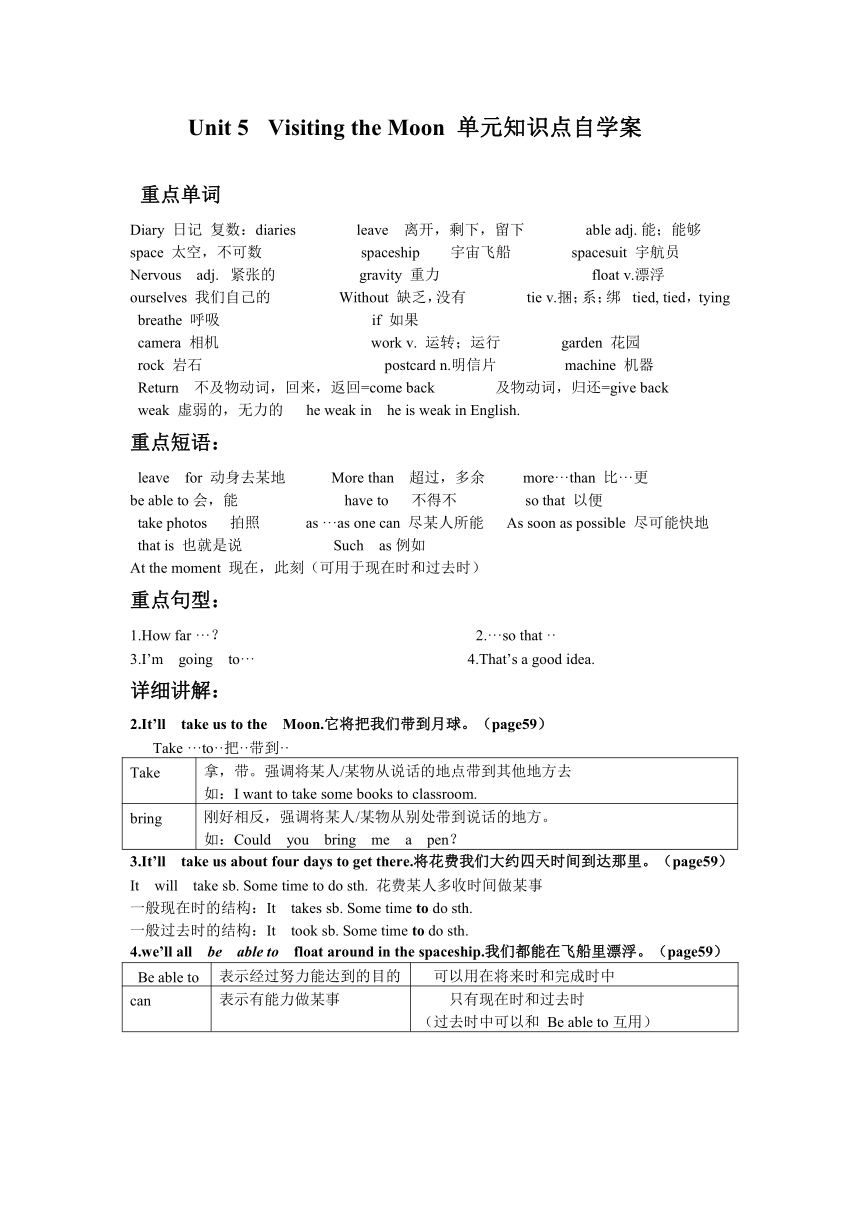Unit 5 Visiting the Moon 单元知识点自学案
文档属性
| 名称 | Unit 5 Visiting the Moon 单元知识点自学案 |  | |
| 格式 | zip | ||
| 文件大小 | 14.8KB | ||
| 资源类型 | 教案 | ||
| 版本资源 | 牛津广州版 | ||
| 科目 | 英语 | ||
| 更新时间 | 2015-10-18 15:42:38 | ||
图片预览

文档简介
Unit 5 Visiting the Moon 单元知识点自学案
重点单词
Diary 日记 复数:diaries leave 离开,剩下,留下 able adj. 能;能够
space 太空,不可数 spaceship 宇宙飞船 spacesuit 宇航员
Nervous adj. 紧张的 gravity 重力 float v.漂浮
ourselves 我们自己的 Without 缺乏,没有 tie v.捆;系;绑 tied, tied, tying
breathe 呼吸 if 如果
camera 相机 work v. 运转;运行 garden 花园
rock 岩石 postcard n.明信片 machine 机器
Return 不及物动词,回来,返回=come back 及物动词,归还=give back
weak 虚弱的,无力的 he weak in he is weak in English.
重点短语:
leave for 动身去某地 More than 超过,多余 more···than 比···更
be able to会,能 have to 不得不 so that 以便
take photos 拍照 ( http: / / www.21cnjy.com ) as ···as one can 尽某人所能 As soon as possible 尽可能快地
that is 也就是说 Such as例如
At the moment 现在,此刻(可用于现在时和过去时)
重点句型:
1.How far ···? 2.···so that ··
3.I’m going to··· 4.That’s a good idea.
详细讲解:
It’ll take us to the Moon.它将把我们带到月球。(page59)
Take ···to··把··带到··
Take 拿,带。强调将某人/某物从说话的地点带到其他地方去如:I want to take some books to classroom.
bring 刚好相反,强调将某人/某物从别处带到说话的地方。如:Could you bring me a pen?
It’ll take us about four days to get there.将花费我们大约四天时间到达那里。(page59)
It will take sb. Some time to do sth. 花费某人多收时间做某事
一般现在时的结构:It takes sb. Some time to do sth.
一般过去时的结构:It took sb. Some time to do sth.
we’ll all be able t ( http: / / www.21cnjy.com )o float around in the spaceship.我们都能在飞船里漂浮。(page59)
Be able to 表示经过努力能达到的目的 可以用在将来时和完成时中
can 表示有能力做某事 只有现在时和过去时(过去时中可以和 Be able to互用)
4.We’ll have ( http: / / www.21cnjy.com )to tie ourselves to our beds so that we won’t float away in our sleep!(page59)
我们不得不把我们自己系在床上,以便我们睡着事不会漂走。
have to 必须,不得不,后面加动词原形。
have to 侧重客观上的“必须”I have to study hard.(爸爸压着) 比must更多时态上的变化 否定形式:don’t/doesn’t have to
must 侧重个人主观意愿“必须”I must study hard.(想上大学) 可以表示现在和将来,人称 和数不用变化 直接在后面加“not”,是“禁止”的意思。
feed sth. to sb.中的feed后加的是食物,to 后加的是动物或者小孩 “用食物喂某人或动物”
feed sb. On sth. 中feed后加人或动物名称,on后加食物“给某人或动物喂点食物”
We will be able to ( http: / / www.21cnjy.com )build hotels there in the future.在将来我们将能在那里建造旅馆(page68)
in the future 在将来,在未来 时间范围比in future还大
in future 今后,从此以后 指离现在较近的一段时间
in future
in the future 巧计:这个的单词组成较长,所以时间范围也比较长
Thousands of year ( http: / / www.21cnjy.com )s ago ,there was a Chinese story about Chang’e flying to the Moon.(page70) 几千年前,有一个嫦娥奔月的中国传说。
Thousands of 数以千计的
①Hundred (百),Thousand(千),million(百万)等用复数形式修饰时要有··of+复数名词,前面不能加具体的数字。
②Hundred ,Thousand,million,billion(十亿)前面如有具体数字,不能在他们后面加“s”
Grammar
一般将来时:表示将来某个时间要发生的动作或者存在的状态,常与一些表示将来的时间的状语连用。
1.基本结构:一般由“助动词will+动词原形”或者“be going to +动词原形”构成。
2.注意:will是助动词,不能独立使用,前面的主语无论是什么人称,后面都是will。它的否定形式是will not,缩写为 won’t.
3.时间状语:tomorrow,next time/week ,in a month/week,from now on ,soon.
4.基本句型:
肯定句:主语+will/be going to +动词原形+其他
如:He will come here at onc.
否定句:主语+won’t/be not going to +动词原形+其他
如:He will not go to Shenzhen.
一般疑问句:Will+主语+动词原形+其他?
Be(am,are,is)+主语+动词原形+其他?
如:Will you help me with my English
Are you going to Happy Valley ( app:ds:Happy Valley ) of Shenzhen
(4)特殊疑问句:疑问词+一般疑问句?
What will the students have for breakfast?
will 和be going to 的区别:
(1)will :与主观意图无关的将来,表示必然要发生的客观规律。
如:The flowers will come out in a few days.
(2)be going to:一般 ( http: / / www.21cnjy.com )表示计划、打算或准备要做的事情,和有迹象将要发生或者 肯定要发生的事情。 如:Look!It’s going to rain.
重点单词
Diary 日记 复数:diaries leave 离开,剩下,留下 able adj. 能;能够
space 太空,不可数 spaceship 宇宙飞船 spacesuit 宇航员
Nervous adj. 紧张的 gravity 重力 float v.漂浮
ourselves 我们自己的 Without 缺乏,没有 tie v.捆;系;绑 tied, tied, tying
breathe 呼吸 if 如果
camera 相机 work v. 运转;运行 garden 花园
rock 岩石 postcard n.明信片 machine 机器
Return 不及物动词,回来,返回=come back 及物动词,归还=give back
weak 虚弱的,无力的 he weak in he is weak in English.
重点短语:
leave for 动身去某地 More than 超过,多余 more···than 比···更
be able to会,能 have to 不得不 so that 以便
take photos 拍照 ( http: / / www.21cnjy.com ) as ···as one can 尽某人所能 As soon as possible 尽可能快地
that is 也就是说 Such as例如
At the moment 现在,此刻(可用于现在时和过去时)
重点句型:
1.How far ···? 2.···so that ··
3.I’m going to··· 4.That’s a good idea.
详细讲解:
It’ll take us to the Moon.它将把我们带到月球。(page59)
Take ···to··把··带到··
Take 拿,带。强调将某人/某物从说话的地点带到其他地方去如:I want to take some books to classroom.
bring 刚好相反,强调将某人/某物从别处带到说话的地方。如:Could you bring me a pen?
It’ll take us about four days to get there.将花费我们大约四天时间到达那里。(page59)
It will take sb. Some time to do sth. 花费某人多收时间做某事
一般现在时的结构:It takes sb. Some time to do sth.
一般过去时的结构:It took sb. Some time to do sth.
we’ll all be able t ( http: / / www.21cnjy.com )o float around in the spaceship.我们都能在飞船里漂浮。(page59)
Be able to 表示经过努力能达到的目的 可以用在将来时和完成时中
can 表示有能力做某事 只有现在时和过去时(过去时中可以和 Be able to互用)
4.We’ll have ( http: / / www.21cnjy.com )to tie ourselves to our beds so that we won’t float away in our sleep!(page59)
我们不得不把我们自己系在床上,以便我们睡着事不会漂走。
have to 必须,不得不,后面加动词原形。
have to 侧重客观上的“必须”I have to study hard.(爸爸压着) 比must更多时态上的变化 否定形式:don’t/doesn’t have to
must 侧重个人主观意愿“必须”I must study hard.(想上大学) 可以表示现在和将来,人称 和数不用变化 直接在后面加“not”,是“禁止”的意思。
feed sth. to sb.中的feed后加的是食物,to 后加的是动物或者小孩 “用食物喂某人或动物”
feed sb. On sth. 中feed后加人或动物名称,on后加食物“给某人或动物喂点食物”
We will be able to ( http: / / www.21cnjy.com )build hotels there in the future.在将来我们将能在那里建造旅馆(page68)
in the future 在将来,在未来 时间范围比in future还大
in future 今后,从此以后 指离现在较近的一段时间
in future
in the future 巧计:这个的单词组成较长,所以时间范围也比较长
Thousands of year ( http: / / www.21cnjy.com )s ago ,there was a Chinese story about Chang’e flying to the Moon.(page70) 几千年前,有一个嫦娥奔月的中国传说。
Thousands of 数以千计的
①Hundred (百),Thousand(千),million(百万)等用复数形式修饰时要有··of+复数名词,前面不能加具体的数字。
②Hundred ,Thousand,million,billion(十亿)前面如有具体数字,不能在他们后面加“s”
Grammar
一般将来时:表示将来某个时间要发生的动作或者存在的状态,常与一些表示将来的时间的状语连用。
1.基本结构:一般由“助动词will+动词原形”或者“be going to +动词原形”构成。
2.注意:will是助动词,不能独立使用,前面的主语无论是什么人称,后面都是will。它的否定形式是will not,缩写为 won’t.
3.时间状语:tomorrow,next time/week ,in a month/week,from now on ,soon.
4.基本句型:
肯定句:主语+will/be going to +动词原形+其他
如:He will come here at onc.
否定句:主语+won’t/be not going to +动词原形+其他
如:He will not go to Shenzhen.
一般疑问句:Will+主语+动词原形+其他?
Be(am,are,is)+主语+动词原形+其他?
如:Will you help me with my English
Are you going to Happy Valley ( app:ds:Happy Valley ) of Shenzhen
(4)特殊疑问句:疑问词+一般疑问句?
What will the students have for breakfast?
will 和be going to 的区别:
(1)will :与主观意图无关的将来,表示必然要发生的客观规律。
如:The flowers will come out in a few days.
(2)be going to:一般 ( http: / / www.21cnjy.com )表示计划、打算或准备要做的事情,和有迹象将要发生或者 肯定要发生的事情。 如:Look!It’s going to rain.
